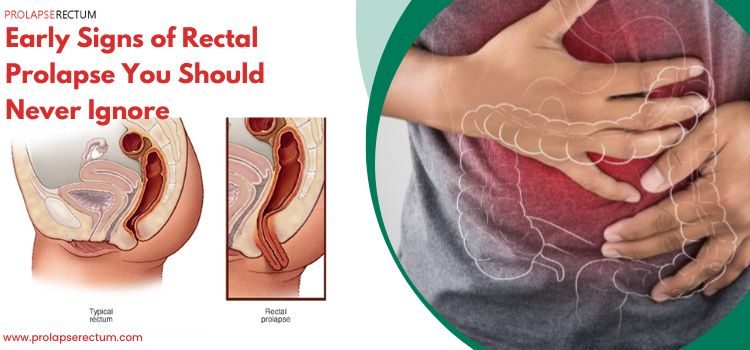Summary: Recognizing rectal prolapse early is key. Symptoms like discomfort, bulge near anus, bleeding, or bowel issues should not be ignored. Timely treatment, including Ayurvedic care, prevents worsening.
Sometimes, when your body does not function properly, it gives you the signal that something is wrong. People took them lightly at first and ignored them. But after some time, it converted into a bigger health issue, such as rectal prolapse. If people know the early symptoms of rectal prolapse, then it will be beneficial for them to choose the right treatment on time.
Maybe you can’t notice at first, and it seems harmless to you. But it can make the condition worse if you ignore it. That’s why we are here with our web blog to help you learn the early symptoms of rectal prolapse.
Key Signs That Point to Rectal Prolapse
Good health usually relies on recognizing tiny changes in the body before they become problems. Most people dismiss peculiar signs in the digestive system, assuming they are transient. But some signs should never be rejected, as they could be a warning of an underlying condition that requires immediate attention. By paying attention to the early warnings, you can take proper action towards treatment and avoid further complications. Obeying your body is the key to remaining healthy.
- A soft mass or bulge is detected near the anus, particularly after defecation.
- A sense of not having fully emptied the bowel, even upon having passed stool.
- Discomfort or pain in the pelvic or lower back area.
- White, pink, or red mucus discharge from the anus that can stain undergarments.
- Bleeding when or after passing stool.
- An uninterrupted urge to pass stool, even when the bowel is empty.
- Straining to pass gas or stool, with leakage.
- Itching, puffiness, or redness around the anus.
- Heaviness or a feeling of pressure in the rectum.
- Discomfort that prevents sitting for any extended period.
Ignoring these early symptoms of rectal prolapse can lead to the condition even worse. So, it is better to choose a suitable treatment and lifestyle modification on time for overall well-being.
Ending Notes
It is extremely important to identify the initial rectal prolapse symptoms for your well-being. If you do not pay heed, the problem can become grave. If you experience signs like a lump in the rectum, discomfort, blood, or bowel incontinence, then it is best that you seek better treatment.
However, Daya Ayush Therapy Centre is known for its Ayurvedic treatment to fully cure rectal prolapse at its core. Many patients find Ayurvedic treatment a better option than other conventional treatments.
Questions That Are Frequently Asked
Q1. When I should be concerned about rectal prolapse?
Ans: You should be concerned about rectal prolapse if you notice persistent bulging, pain, bleeding, bowel control problems, or worsening symptoms. Seek medical attention immediately.
Q2. What can be mistaken for rectal prolapse?
Ans: Conditions that may be mistaken for rectal prolapse include hemorrhoids, anal polyps, rectal tumors, skin tags, or severe anal fissures, as they cause similar symptoms.
Q3. What tests show rectal prolapse?
Ans: Doctors use physical examination, colonoscopy, defecography, anorectal manometry, and MRI scans to confirm rectal prolapse, assess severity, and rule out related bowel or pelvic conditions.
Q4. How to self-diagnosed rectal prolapse?
Ans: Rectal prolapse can be self-noticed if tissue protrudes from the anus, especially during bowel movements, with discomfort, bleeding, or incomplete evacuation sensations.




